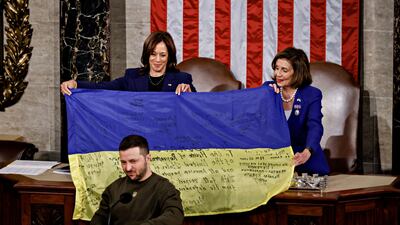Support among Americans for increased military and economic aid to Ukraine has dipped, with the war approaching the one-year mark and as President Joe Biden and members of his administration travel to Europe to demonstrate the US commitment to the war-torn country's defensive efforts.
Forty-eight per cent of respondents to an AP-Norc poll were in favour of the US providing weapons to Ukraine, down from 60 per cent in May last year. Twenty-nine per cent of those polled were opposed to providing Kyiv with weapons.
Likewise, support for government funding to Ukraine has also dipped, from 44 per cent to 37 per cent.
While 63 per cent of Americans are in favour of sanctions against Russia, that, too, has experienced a decline in support since the war's three-month mark.
And 59 per cent of respondents were more concerned about limiting damage to the US economy than sanctioning Russia as effectively as possible in a possible sign that inflation is on the minds of many.
The latest polling will muddy the message of unity and support that Mr Biden's administration is trying to demonstrate to Ukraine and its allies in the week ahead.
US Secretary of Defence Lloyd Austin and Chairman of the Joint Chiefs of Staff Gen Mark Milley were in Belgium this week to reassure the Ukraine Defence Contact Group that Washington's opposition to Russian President Vladimir Putin's invasion is firm.
“Together, we have made clear that we will support Ukraine's self defence for the long haul. And we will move out with the urgency that the moment demands,” Mr Austin said.
Vice President Kamala Harris on Thursday night will travel to the Munich Security Conference to send a similar message. Ms Harris is expected to meet UK Prime Minister Rishi Sunak, German Chancellor Olaf Scholz and other western leaders, and will deliver a speech to the conference on Saturday, Politico reported.
Mr Biden will travel to Poland next week to mark the war's first anniversary.
He is scheduled to reaffirm Washington's “unwavering support” for Nato in conversations with Polish President Andrzej Duda and leaders of the bloc's eastern flank. While in Poland, he will also deliver a speech on how the US “will continue to stand with the people of Ukraine for as long as it takes”, the White House said.
Support for Mr Biden's handling of the war in Ukraine is split along party lines, with Democratic voters expressing more confidence in the President than Republicans.
The US has committed more than $26.7 billion to Ukraine since Russia's invasion on February 24. Washington has delivered weapons in the form of Himars systems, Javelins, firearms and, most recently, 31 M1 Abrams tanks.
But questions remain over whether the US will continue to deliver such aid to Ukraine with the House of Representatives controlled by Republicans, whose leadership has expressed scepticism over providing future aid. House Speaker Kevin McCarthy previously said he would not send a “blank cheque” to Kyiv, citing recession fears.
The House in December, at the time controlled by Democrats, approved a funding bill that allocated about $45 billion for Ukraine and Nato allies. The funding package is expected to last through September.












